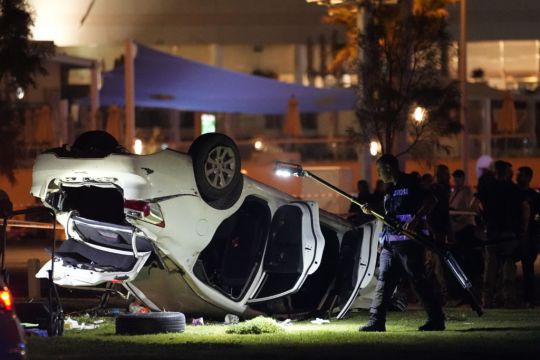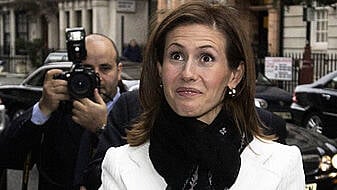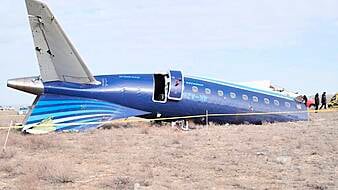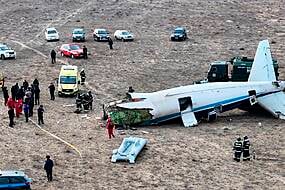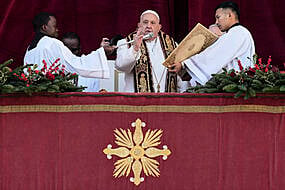At least one person has been killed and six others – including British citizens – were wounded when a car was driven into a number of people in Tel Aviv, Israeli authorities said.
The driver rammed into a group of people near a popular seaside park in the city, which is Israel’s commercial hub, police said.
Israel’s rescue service said a 30-year-old Italian tourist was killed and five other Italian and British citizens – including a 74-year-old man and a 17-year-old girl – received mild to moderate injuries.
Police said they shot and killed the driver of the car, later identifying him as a 45-year-old Palestinian citizen of Israel from the village of Kafr Qassem.
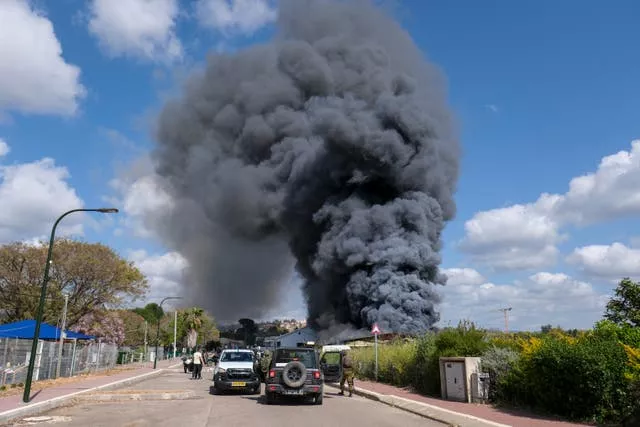
Italian Premier Giorgia Meloni’s office expressed sympathy for the family of the victim and “solidarity with Israel for the vile attack”. She identified the man killed as Alessandro Parini, from Rome.
The attack came against the backdrop of heightened tensions after Israeli air strikes on Palestinian militant targets in both Lebanon and Gaza, as well as a shooting attack in the occupied West Bank that killed two people.
That followed days of violence and unrest in Jerusalem’s most sensitive holy site, the compound of the Al-Aqsa mosque in the Old City.
Prime Minister Benjamin Netanyahu said he was calling up all reserve forces in Israel’s border police “to confront the terror attacks”.
The Hamas militant group that rules Gaza praised the attack in Tel Aviv as a response to Israel’s “crimes against Al-Aqsa Mosque and worshippers”.
Earlier, an alleged Palestinian shooting attack near an Israeli settlement in the occupied West Bank killed two British-Israeli sisters and seriously wounded their mother, Israeli officials said.
The attack, coming after weeks of heightened unrest in the West Bank, suggested the recent tensions in Jerusalem could be spilling over to the occupied territory.

Even as quiet returned to Israel’s northern and southern borders, the early morning Israeli strikes on Lebanon — which analysts described as the most serious border violence since Israel’s 2006 war with Lebanon’s Hezbollah militants — threatened to push the confrontation into a new phase.
Israeli strikes came in retaliation for a major barrage of rockets from Lebanon the day before, after Israeli police raids at the Al-Aqsa Mosque in Jerusalem spiralled into unrest and sparked outrage across the Arab world.
Although the Israeli military was quick to emphasise that its warplanes struck sites belonging to only Palestinian militant groups, the barrage risks drawing in Israel’s bitter foe Hezbollah, which holds sway over much of southern Lebanon and has in the past portrayed itself as a defender of the Palestinians and the contested city of Jerusalem.
The shooting in the West Bank, near an Israeli settlement in the Jordan Valley, killed the sisters in their 20s and seriously wounded their 45-year-old mother, Israeli officials said. The women were British citizens, the Foreign Office said, expressing remorse for their deaths and calling for both sides to de-escalate.
The three were residents of the Israeli settlement of Efrat, near the Palestinian city of Bethlehem, said Oded Revivi, the settlement’s mayor.
The girls’ father was driving in a car behind his wife and daughters and witnessed the attack, the mayor added. Medics said they dragged the unconscious women from the smashed car, which appeared to have been pushed off the road.

Mr Netanyahu and defence minister Yoav Gallant toured the site of the shooting late on Friday and vowed to catch the attacker. “It’s just a matter of time, and not much time, until we settle the score,” Mr Netanyahu said.
Israeli missiles had earlier struck an open field in the southern Lebanese town of Qalili, near the Palestinian refugee camp of Rashidiyeh, according to an Associated Press photographer and residents, killing several sheep and inflicting minor injuries on residents, including Syrian refugees.
Other strikes hit a small bridge and power transformer in the nearby town of Maaliya and damaged an irrigation system providing water to orchards in the area.
The Israeli military said it was boosting infantry and artillery forces in a defensive move “to prepare for all possible scenarios”.
A Palestinian official said Egyptian security officials were working with Hamas and Israel to de-escalate the situation.
Later on Friday, there were signs that both sides were trying to keep the hostilities in check. Fighting on Israel’s northern and southern borders subsided after dawn, and midday prayers at the Al-Aqsa Mosque passed peacefully after an early flashpoint.
In 2021, an escalation also triggered by clashes at the compound spilled over into an 11-day war between Israel and Gaza’s Hamas rulers.

Chaos erupted at one of the entrances to the esplanade before dawn prayers as Israeli police wielding batons descended on crowds of Palestinian worshippers, who chanted slogans praising Hamas as they tried to squeeze into the site.
An hour later, according to videos, people leaving the prayers staged a vast protest on the limestone courtyard, with Palestinians raising their fists and shouting in support of Hamas rocket fire, and Israeli police forced their way into the compound.
Police did not comment on the earlier beatings, but said security forces entered the compound after prayers in response to “masked suspects” who threw rocks towards officers at one of the gates.
The Israeli military said Palestinian militants in Gaza had so far fired 44 rockets from Gaza, only 23 of which crossed into Israeli territory. The others either failed to launch, fell into the Mediterranean Sea or were intercepted by Israel’s Iron Dome aerial defence system, the military said.
Most missiles that crossed the border struck open areas in Israel’s south, but one landed in the town of Sderot, sending shrapnel slicing into a house.
The Israeli military said it pounded Gaza with more air strikes, hitting 10 targets described as underground tunnels, along with weapons production and development sites belonging largely to the Hamas militant group.
There were no immediate reports of casualties in Gaza, but the Palestinian Health Ministry said one of the strikes caused some damage to a children’s hospital in Gaza City.
